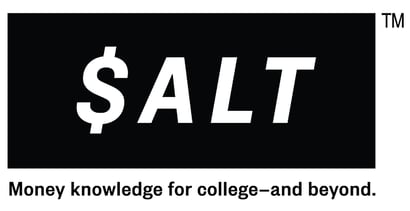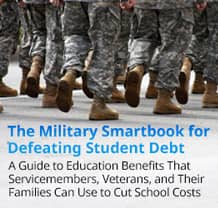

In a nutshell: Developed by nonprofit American Student Assistance, SALT™ is a free online resource that helps students learn personal finance and make better decisions about paying for and paying back the cost of their education.
Undergraduate college students have to deal with some of the most bizarre and tumultuous economic changes of their lives. One moment they’re living at home with very few expenses, and the next they’re fending for themselves and, in many cases, taking on debt equivalent to a low-end luxury car.
These early years are critical as well, especially when it comes to establishing one’s credit history and long-term financial goals.
Private nonprofit organization American Student Assistance saw the lack of adequate resources available for undergrads and created SALT, a comprehensive program that helps students learn the basics of money management and get their degree “in a financially responsible way.”
I spoke with ASA’s Managing Director of Product Development, Alisa Wilke, to find out what makes SALT so innovative.
Developing a “Readiness to Engage” Personal Finance
Unlike most financial literacy programs targeted toward young adults, SALT offers a complete suite of different resources like interactive lessons, tools and media, as well as an active community of students, alumni and financial counselors who help one another grow and solve problems.
“We focus on five key areas of financial literacy need: budgeting, credit, jobs, scholarships and student loan repayment options,” Wilke said. “From our market research surveys and benchmark assessments, we’ve identified these as the fundamental areas where students say they need help or demonstrate a lack of proficiency in the topic.”
“We focus on five key areas of financial literacy need: Budgeting, credit, jobs, scholarships and student loan repayment options.”

SALT’s short film “The Red” engages students as a psychological thriller about student loans.
As a way to connect with an audience with a fleeting and selective attention span, many of the lessons are cleverly hidden in things like comics and movies.
For example, SALT partnered with Borderline Films to produce “The Red,” a short psychological thriller that helps students understand and cope with the anxiety that comes with student loan debt.
“There has to be a state of readiness to engage in financial education,” Wilke said. “We want to develop that interest so as to help build good financial habits early. Step one is to get users interested and engaged with small nuggets of financial information at the time when they are most receptive to it.”
Teaching the Importance of Credit Early
When it comes to knowledge about how credit scores and reporting works, millennials (adults aged 18 to 34) rank notoriously low. According to Wilke, they’ll have a rude awakening if they don’t learn about credit — and fast.
“You need credit to be part of the financial economy. That’s just the way it works,” she said. “You can’t pay for everything in cash. We try to explain that credit is the way to engage and be part of the economy. They have a lot of questions about that.”
“You can’t pay for everything in cash. We try to explain that credit is the way to engage and be part of the economy.”
Their materials for actually teaching credit are refreshingly sleek and helpful, and it’s clear SALT knows their audience extremely well.
For example, check out this excellent video featuring the endearingly clueless Blake:
“We try to explain that good credit is a good thing. It is incredibly valuable to have good credit,” Wilke said. “If you have bad credit, things cost you more. We try to make it easier for them to understand concepts like this by cutting it up into sections.”
If you haven’t done it yet, there are plenty of sites that let you check your credit score for free.
Helping Students Pay for College Responsibly
What makes SALT really helpful is its extensive collection of tools and resources for helping students find responsible ways of paying for college. The program helps students gain a firm understanding of the different types of federal loans and where to find scholarships of all kinds.
 The team behind SALT also produces content geared toward specific populations of students and the unique challenges they face. For example, students who will serve or have served in the U.S. armed forces can get tips on military-only grants and scholarships with SALT’s “Military Smartbook for Defeating Student Debt.”
The team behind SALT also produces content geared toward specific populations of students and the unique challenges they face. For example, students who will serve or have served in the U.S. armed forces can get tips on military-only grants and scholarships with SALT’s “Military Smartbook for Defeating Student Debt.”
If students should find themselves having trouble repaying student loans, they can refer to one of SALT’s many articles tailored made for unique situations like postponing repayments due to a disaster or recovering from a student loan default. Students can turn to the site for everything from making their very first budget to repaying loans years after they’ve graduated.
The site also offers lessons and tools to help students find a job after college. Tips on writing cover letters and resumes, how to interview well and the importance of networking are a few of the topics covered in the group’s job-finding section.
SALT’s Role in the Financial Literacy Movement
Since the financial crisis of 2007-08, organizations and community leaders have been pushing for greater financial literacy education for young Americans, lest they repeat the same mistakes in the future.
SALT has been one of the most prolific participants in this movement, partnering with more than 250 schools around the country and spanning the “full spectrum” from small private colleges to major public universities, Wilke said.
However, she and her organization realize there’s still plenty of work to be done, considering the gap in available resources between different types of institutions.
“Some huge state institutions will have a whole department and program to fulfill financial literacy education, and then you’ll see some small private or community colleges where the resources are very tight,” Wilke said. “They see the value, for sure… The bigger question is helping universities see the results, see the impact of financial literacy and understand how to measure that impact.”
Photo credits: ASA/SALT, Wikimedia
Advertiser Disclosure
BadCredit.org is a free online resource that offers valuable content and comparison services to users. To keep this resource 100% free for users, we receive advertising compensation from the financial products listed on this page. Along with key review factors, this compensation may impact how and where products appear on the page (including, for example, the order in which they appear). BadCredit.org does not include listings for all financial products.
Our Editorial Review Policy
Our site is committed to publishing independent, accurate content guided by strict editorial guidelines. Before articles and reviews are published on our site, they undergo a thorough review process performed by a team of independent editors and subject-matter experts to ensure the content’s accuracy, timeliness, and impartiality. Our editorial team is separate and independent of our site’s advertisers, and the opinions they express on our site are their own. To read more about our team members and their editorial backgrounds, please visit our site’s About page.




